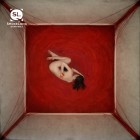My little sister moved into the chandelier in our dining room. She had a pillow and some jars of food and hopefully something for a bathroom. When our mother came to talk at her—about the party tomorrow, about safety, about lots of things—something fell on her head.
I picked it up and it was one of the rungs of the ladder Penelope used to get up into the chandelier. An hour later, all the pieces were on the ground beside us. “Cancel the party,” Penelope finally said, waving down with both hands, one gripped around the screwdriver and the other around the screws from the ladder.
My mother was against the wall in a different way than I was, afraid the chandelier and everything else would come crashing.
My family was the sort of rich you’d see on a television show or in a magazine article. The upcoming party was for Bastille Day because our father was bored and 1/16 French. When Penelope still wouldn’t get down he looked up some French proverbs and came back an hour later with À chaque oiseau son nid est beau: the bird loves her own nest.
Penelope had been up in the chandelier one other time, when she was nine and I was fourteen. There had been a rumor around the neighborhood that a man back in the 1900s hanged himself from the chandelier and she wanted to check for rope marks.
When Penelope didn’t find any rope marks I asked her, “So there’s nothing to worry about?” and helped her down onto the ladder. I was just starting to develop a nervous energy that required me to use my entire self to simply make a day proceed.
“Not ghosts, at least,” she said, moving her hand from mine and wrapping her fingers around the chandelier, swinging lightly.
I went to the doctor for my anxiety and she told me that some people feel it as a coil, like there’s no clarity between a problem and its solution. She asked me what I worried about the most and I said, “Tomorrow.”
“Thankfully, you’ll never get there,” she said, the smallest of comforts, almost.
The parties were always happening. Arbor Day and Earth Day and Casimir Pulaski Day. There were galas for full moons. I always showed up to say very little and count the snacks everyone ate so I could eat two fewer than the person who ate the most.
At the last party before this one, Penelope told our mother, our mother who has never been sage or helpful, that she didn’t understand why we needed to have so many parties.
“This is how to never get hurt,” our mother said, motioning to the monster-themed event happening behind us. The Creature from the Black Lagoon was blowing bubbles in his wine. The Bride of Frankenstein was reaching around and ringing the doorbell from inside the house, over and over and over.
Penelope was still in the chandelier, eating some matzo chips she’d brought up with her. Our parents were below her and going through dinner on a new diet where they each had three tiny glasses in front of them, one with whole milk, one with apple cider vinegar, and one with ginger ale, and that was dinner. My father slid me a notebook after he finished and said, “Here’s a notebook.”
“I’ve been reading about safety objects,” my mother said. “This can be yours if you just think of all the possibilities in a blank page.”
They left the room without saying anything to Penelope right above us. I gripped my glass of water and before I could think against it I tossed it up straight. Penelope reached out and caught it with all the drops still in there, still so close together.
Upstairs, I took my finger and pretended to draw a line on each page of the notebook. Like falling water, like a rope to a neck: rumors we only tell ourselves.
My parents made a hard turn on ignoring Penelope and spent all day trying instead to bribe her down. The only thing she wanted was the party to be cancelled. Our father yelled at his watch until it yelled back and then he was on the phone, promising to trade money for time as usual.
A crew of men with hard hats showed up pushing machines that looked like part of an infomercial for terrorizing people who loved shrubbery. They raised one carefully toward the chandelier. Penelope held on and nodded at me as I climbed up the china cabinet.
I jumped off and caught the edge of the chandelier. It creaked and dipped a bit as Penelope grabbed onto the arm of the machine and slid down to the ground.
When I pulled my head up through the middle of the chandelier, I saw a rope mark on the center beam. To the side of it, the glass of water I’d tossed up to Penelope was somehow still full. Guests began to wander in as I kicked my legs back and forth, kicked ghosts one way and tomorrow another, and when the glass tipped perfectly onto my bottom lip, I drank it so slow that our father’s French flag bow tie was the only thing wrong with the world.

Notes from Guest Reader SJ Sindu
In “Straight Lines,” the mundane and the surreal blend as two siblings search for realness in a family that values frivolous distraction. I loved how the narrator’s adolescent isolation is undercut by a dry and biting humor. In three pages, “Straight Lines” paints a vivid picture of four characters who broke my heart with their struggles to free themselves from pain.


 The core workshop of SmokeLong Fitness is all in writing, so you can take part from anywhere at anytime. We are excited about creating a supportive, consistent and structured environment for flash writers to work on their craft in a community. We are thrilled and proud to say that our workshop participants have won, placed, or been listed in every major flash competition. Community works.
The core workshop of SmokeLong Fitness is all in writing, so you can take part from anywhere at anytime. We are excited about creating a supportive, consistent and structured environment for flash writers to work on their craft in a community. We are thrilled and proud to say that our workshop participants have won, placed, or been listed in every major flash competition. Community works.